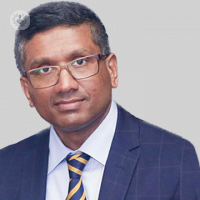How is pilonidal sinus disease treated?
Written by:In this article, Mr Vijitha Chandima Halahakoon, renowned consultant general surgeon, provides a comprehensive insight into pilonidal sinus disease. The Colchester-based specialist discusses symptoms, diagnosis and treatment, among other important points.

What is pilonidal sinus disease?
A pilonidal sinus is a tract or cavity of the natal cleft (the crease between the two buttocks) characterised by repeated infection and chronic inflammation. It presents like a small hole or tunnel in the skin.
The formation of a pilonidal sinus is caused by hair becoming embedded in the skin crevices and causing an infection. Pilonidal sinus disease is more common in young Caucasian men who have lots of body hair and who have a high BMI, usually occurring between puberty and the age of 40.
What are the symptoms of pilonidal sinus disease?
The symptoms of a pilonidal sinus include:
- a small dimple in the skin
- irritation or discomfort
- severe pain
- a painful mass, which may be an abscess
- smelly discharge
- drainage from the area, which may be pus or blood, accompanied by foul odour and hair protruding from the lesion
There could be more than one pilonidal sinus tract or hole in the skin.
How is it diagnosed?
Pilonidal sinus disease is usually diagnosed by physical examination of the affected area. A doctor may also ask about the patient’s symptoms and medical history.
In more complex situations, imaging tests such as an ultrasound or an MRI may be ordered to help confirm the diagnosis, especially to differentiate pilonidal sinus disease from an anal fistula.
How is pilonidal sinus disease treated?
There are various surgical procedures available to treat pilonidal sinuses when they are at the stage of a chronically discharging recurrent sinus.
Minimally invasive procedures like endoscopic pilonidal sinus treatment (EPSiT) have the advantage of early recovery, minimal pain, and an early return to work. EPSiT does not involve tissue excision, and as such, there will be no more scars than what the patient already has. EPSiT can also be done as a day-case procedure under general anaesthesia, and carries a healing rate of around 70 per cent. The procedure can be repeated if it fails.
Besides EPSiT, there are several excisional operations available. Some involve simple closure of the wound, whereas others involve local flaps. The commonest flap procedures are Bascom’s and Karydarkis’. Plastic surgical flaps are reserved for more complex wounds.
In extreme situations, rarely, the wound will have to be left open to heal from the inside with granulation tissue.
In more acute settings when patients present with pilonidal abscess, this will need incision and drainage with antibiotics to counter the acute infection.
It is often advised to keep the area hair-free to avoid a recurrence, however, its usefulness is questionable.
Mr Vijitha Chandima Halahakoon is a highly accomplished consultant general surgeon with over 20 years’ experience who specialises in the treatment of pilonidal sinuses.
If you require expert assistance and treatment for a pilonidal sinus, do not hesitate to book an appointment with Mr Halahakoon via his Top Doctors profile today.


